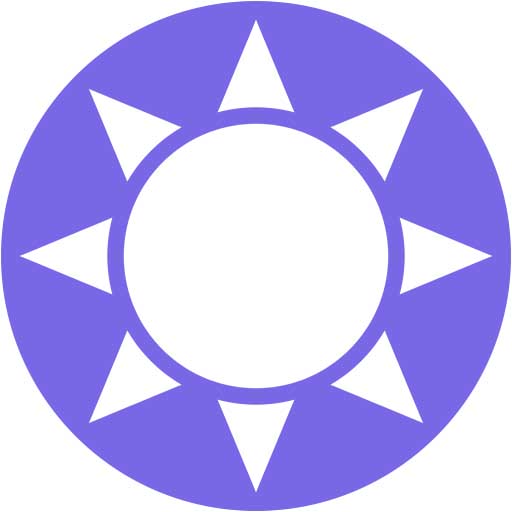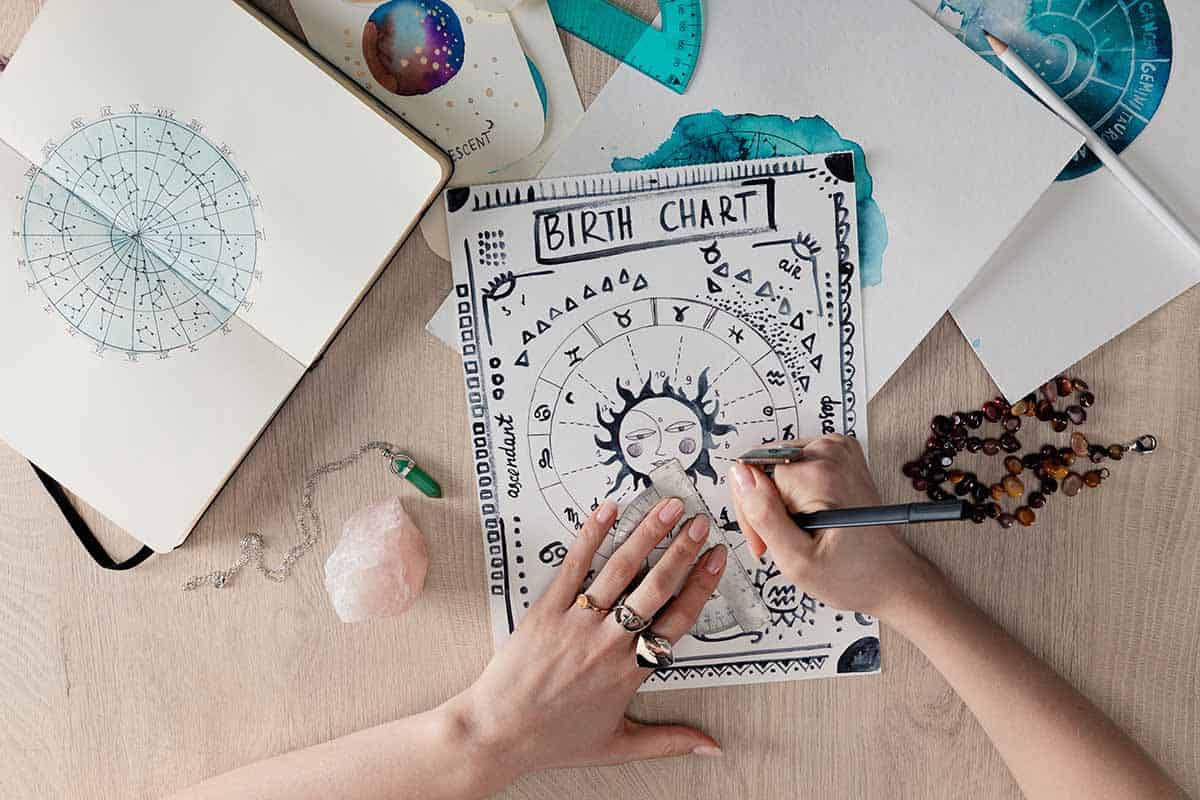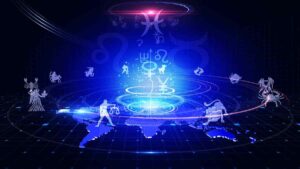Astrology has been a pop-culture phenomenon since the New Age movement in the early seventies. People all over the world engage with astrology on a daily basis, some more sincerely than others, and the business of astrological predictions, literature, and merchandise is a booming industry. But, outside of the cute mugs and daily horoscopes, what exactly is Astrology?
Astrology is a method of divining and predicting terrestrial events and human actions based on the positioning of stars and celestial bodies. Based on the studies of early astronomers, astrology assigns supernatural or mystical meaning to the placement of the sun, moon, and constellations.
The extent to which people today believe in astrology varies. There are those who plan their days and lives based on their sign’s predictions, and there are those who still get astrology confused with astronomy. Keep reading to learn more about astrology, its origins, and how much science is truly at its basis.
Article Contents
What Is Astrology and How Does It Work?
Astrology is the belief that events on earth can be predicted or attributed to the positioning of the sun, moon, and stars.
There are 12 astrological signs, each covering a specific portion of the calendar year. However, they do not line up perfectly with the calendar months.
An individual’s sign is determined by the position of the sun, moon, and constellations in relation to the time and place they were born.
Here are the twelve astrological signs, along with their symbols, traits, and the dates they include:
● Aquarius (Water Bearer): January 20 – February 18 ♒
People born under the sign of Aquarius tend to be esoteric social outcasts, with a dedication to conceptual ideas over feelings and sentiment.
● Pisces (Fish): February 19 – March 20 ♓
Pisces’ personality traits tend to mimic their company and surroundings. They are prone to being dreamers, highly sensitive, and highly emotional.
● Aries (Ram): March 21-April 19 ♈
Aries’ personality is driven and competitive, fueled by a desire to prove self-worth. As a result, Aries tend to be highly self-aware and strongly opinionated.
● Taurus (Bull): April 20 – May 20 ♉
Tauruses are associated with stability. This can manifest either in bullish stubbornness or sturdy emotional foundation based in tradition.
● Gemini (Twins): May 21 – June 21♊
Geminis are considered to be high-energy, charismatic social butterflies. Because they feed off of social energy, Gemini’s tend to fear being alone more than other signs.
● Cancer (Crab): June 22 – July 22 ♋
Unrelated to the devastating disease, people born under the Cancer sign tend to be sensitive, highly empathetic caretakers. Cancers also tend to prefer the comfort and stability of staying home to going out.
● Leo (Lion): July 23 – August 22 ♌
Leo, living up to the symbol, is associated with courage, love, and strength. Leos also have the reputation of being vain and egocentric, using anger as a defense mechanism when their pride appears to be under attack.
● Virgo (Virgin): August 23 – September 22 ♍
Virgos are known as highly aware, though often judgemental, people. Those born under this sign often have a need to feel useful that drives their behavior.
● Libra (Balance): September 23-October 23♎
Libras are notoriously indecisive based on a natural tendency to see both sides of an issue. This leads Libras to often avoid both solitude and conflict.
● Scorpio (Scorpion): October 24 – November 21 ♏
Scorpios tend to be emotionally complicated and withdrawn, although manipulatively charismatic. This generally allows Scorpios to be socially popular, though their popularity is often accompanied by a sense of distance or loneliness.
● Sagittarius (Archer): November 22 – December 21 ♐
Sagittarius is a high-emotion, often bluntly honest sign. Their strong opinions, often formed by emotion rather than fact, are offset by charismatic social energy that makes them friendly and popular.
● Capricorn (Goat) December 22 – January 19 ♑
Capricorns are known as mature and independent people. Capricorns are often driven by a need to prove themselves through action rather than defining their worth by the opinions of others.
Astrologers believe that an individual’s personality, career path, and even their ideal romantic partner can be divined from those signs.
Astrology is not as simple as just twelve signs, however. When astrologers talk about somebody’s “sign,” they’re usually referring to a person’s sun sign. The sun sign is representative of an individual’s soul or personality, according to Natalie Josef and Caroline Harris, while a person’s emotional core and outward appearance are defined by their moon and rising signs, respectively.
Moon, rising, and ascendant signs are derived based on more specific details of an individual’s natal time and place. If you don’t know all your signs, you can enter your birth details into an astrological birth chart. As these other signs are focused on an individual, the accuracy of the type-casting diminishes, raising questions from many around the overall credibility of astrology as a school of thought.
How Does Astrology Work?
Modern astrology applies the personality archetypes associated with each astrological sign to the individuals born under that sign.
A more specific personality reading can be attained by knowing the attributes associated with an individual’s other signs. While the sun sign is usually regarded as the most important and many times the only one people know, the other signs can be used to create a more holistic portrait of someone’s astrological profile.
Fortunately, the moon, ascendant, and rising signs are based on the same twelve constellations, so newcomers to astrology don’t have to worry about memorizing another list of signs. The additional signs provide deeper insight into someone’s character.
For example, an individual born on November 6th has a Scorpio sun sign, labeling them as complex, withdrawn, and brooding, but the presence of a Leo moon sign would add to their character an element of bold, loving warmth.
Is Astrology A Science?
According to Dr. Baird of Texas A&M, it is not. Hard scientists such as Dr. Baird are often quick to dismiss astrology as a pseudoscience. While many devout believers in astrology give sincere testimony to the truth and accuracy of their sign, it is the position of scientists such as Dr. Baird that these results of the placebo effect.
Horoscopes tend to be vague and open to interpretation. This is a common argument against the validity of astrology, often accompanied by a comparison to fortune-telling, new-age alchemy, or other outdated parlor tricks. Still, many people believe that astrology contains at least some fundamental psychological validity, though most stop short of total faith in its divine accuracy.
Others have explained astrological signs and predictions as the result of applied psychology, grouping signs based on personality types and casting individuals into behavior types based on the location and timing of their birth.
That being said, there is a historically scientific process to astrology that has been in practice for thousands of years.
Most traditional scientists and academics consider astrology to be a pseudoscience at best. Still others hold it in a lower position, equating astrology’s credibility to that of ouija boards and seances.
While it must be admitted that astrology is not as grounded in physical science as astronomy or other similar modern disciplines, astrology has scientific roots.
Just alchemy served as a predecessor to modern chemistry, so astrology paved the way for modern astronomy. Early astrologers studied the sky, noticing that the cycles of the sun, moon, and stars had tangible effects on the world around them. They noticed that the tide came and went based on the cycle of the moon and that the constellations were at different points in the sky during different seasons.
These early scientific observations, filtered through the mystical understanding that humans had of natural phenomena at the time, were interpreted as having more of a divine role in the lives of humans.
Still, the accuracy of the early astrologers’ observations on the effect of the moon’s cycle on sublunar elements provided the basis of knowledge that led later astronomers to understand the relationship between the moon and the tide.
This, along with the many other scientific and practical applications that came from the early study of the movement of the stars, can be attributed in part to the foundation of human understanding laid by astrology.
What Is The Basis Of Astrology?
The fundamental premise of astrology is that the celestial bodies–namely the sun, moon, and regular configurations of the stars–have a direct and foreseeable influence over the course of both human and natural events.
In essence, devout followers of astrology believe that all events, both in history and in the future, are predetermined by some celestial power. From that belief, it then follows that the proper reading of the positioning of celestial bodies allows humans to foresee those predetermined events.
When it was first created, and even for the following centuries until the emergence of western science, the influence of the heavenly bodies over the earth was attributed to divine power, Assyria and Babylon, for example, were among the first early civilizations to replace theistic worship with a belief system based on the movements of the stars and planets.
The Greeks and Romans, though later on the historical timeline than the Assyrians and, also associated the movements of the heavenly bodies with divine mysticisms.
The association between the movements of the constellations and the crucial farming, fishing, or hunting seasons led early civilizations to worship the deities associated with each of these natural effects.
Who Created Astrology?
Historians mainly agree that the roots of astrology can be traced back to ancient Babylon. During the first dynasty (roughly 1700BCE), the Babylonians created the Enūma Anu Enlil, which is commonly regarded as the first text concerning the relationship between humans and celestial activity, according to the Encyclopedia Britannica.
Throughout history, however, many civilizations have taken note of the movement of the stars and assigned special, and often supernatural, meaning to the various configurations of the stars and planets.
Throughout later centuries–especially when carried by the invading force of the Persian Empire during the Achaemenian dynasty–the practice of astrology spread over the globe.
The practice of following celestial omens reached as far as China, India, Egypt, and Greece. There was a surge of astrological texts that emerged later, through the early centuries AD, including works from Ptolemy and Hephaestion of Thebes.
Conclusion
So, what exactly is astrology?
Astrology is a belief system directly attributing earthly effects to celestial causes. First created by early Babylonians, astrology traveled across the globe to be adopted and adapted over centuries by many societies. Astrology laid the groundwork for much of our modern understanding of the heavenly bodies and their movements.
In the modern context, however, astrology has taken on another connotation.
Astrology as a pop-culture movement is the belief that everyday activities are predetermined, which therefore can be accurately foreseen and prepared for by the proper study of the configuration of the earth, moon, sun, and constellations at any given point in time and space.




